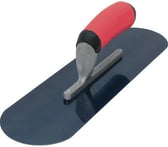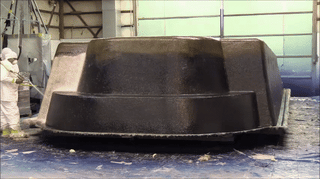Don’t you hate when you’re trying to smooth frosting on a cupcake and it keeps showing the dents from the spoon or knife? If you know how to do it right, tell me your secrets. Bakers must have sold their soul to figure out the magic trick for that. Sure, the cupcakes taste the same either way, but it just looks so much better when they’re smoothly swirled. Welcome to the world of trowel marks on a pool.
Tired of this nonsense? Well, we have answers for you:
- What kind of trowel is leaving these annoying marks on your pool sides and bottom?
- Which types of pools are most prone to trowel marks?
- Can you avoid them entirely?
What is a trowel?
A pool trowel is flat and round-edged. Note that it’s not the same as a garden trowel.

It’s used to apply and smooth thin layers of material. This is usually the surface of concrete and other smoothable materials.
Trowels are used on concrete pools and vinyl liner pools.
On a concrete pool with a plaster surface, you blow the plaster on with a gun and then smooth it out with a trowel. This covers the walls and bottom of the pool.
On a concrete pool with an exposed aggregate surface, the pebbles (or other aggregate) are mixed in with plaster when applied as the pool shell. However, the plaster on the surface is blown off so that you’re left with only the pebbles visible.
On a vinyl liner pool, you use a trowel to apply and smooth the vermiculite or grout as the pool bottom.
Trowel marks are just a cosmetic issue. Still, as with wrinkles in a vinyl liner, many people want to avoid them, and will take the time and effort to fix them if possible.
Can you avoid trowel marks in a pool?
As with anything, it’s better to prevent the problem in the first place than to have to repair it after the fact.
So can you prevent trowel marks on your pretty, pretty pool?
Unfortunately, trowel marks are inevitable on a concrete pool with a plaster interior finish. There’s no way to remove all the trowel marks. You don’t usually see the marks during the day unless they’re really bad. You’ll see them at night when you turn the pool light on.
You don’t see trowel marks on a concrete pool with an exposed aggregate finish. Why? You do still trowel the plaster-based material all over the surface. However, the trowel marks would be on the very top layer of plaster, which the builder blows off. No mark remains there. Nice.
On a vinyl liner pool, trowel marks aren’t inevitable, but you can see them about half the time where they’re left in the vermiculite or grout pool base.
The third option will blow your mind.
Fiberglass pools don’t use trowels. The pool is sprayed onto a mold that’s basically perfect—almost as perfect as you! Because of this, you don’t have the issue of trowel marks.


.png?width=248&name=pool%20shell%20separated%20from%20mold%20(smaller%20with%20labels).png)
Fun fact: the gelcoat of a fiberglass pool never has to be refinished or replaced if manufactured correctly.
Pool options
To be sure you’re getting the best pool for your needs, be sure to compare all three pool types. You may find that the advantages of a fiberglass pool fit you best!
Concrete pools generally cost $50,000-$100,000. By comparison, fiberglass pools cost $45,000-$85,000 upfront but have the lowest lifetime expenses of all three, which saves you money in the long run.

Concrete pools require a lot of maintenance—which includes refinishing the surface every 10-15 years for $10,000. Vinyl liner pools also need to have the liner replaced every 5-9 years at $4,000-$4,500 each time.
Fiberglass pools are super durable, low-maintenance, and pretty! While the shapes and sizes are less customizable than the other two pool types, most people can find a model that fits their needs.
At River Pools we offer fiberglass pools in Virginia and Maryland (and in other areas of the country through our dealers). Read through our ebook about the three pool types, and get in touch with us to see if fiberglass might be the right choice for you. We look forward to helping you!

Up Next:
Concrete Pools vs. Vinyl Liner Pools: An Honest Comparison
10 Common Concrete Pool Problems and How to Avoid Them
A Massive Review of Concrete Swimming Pools: Costs, Maintenance, Longevity, and More
.jpg?width=1400&height=1050&name=FullSizeRender%20-%20Copy%20(3).jpg)
.jpg?width=1400&height=1050&name=FullSizeRender%20-%20Copy%20(3).jpg)




.png?width=248&name=pool%20shell%20separated%20from%20mold%20(smaller%20with%20labels).png)

